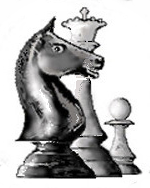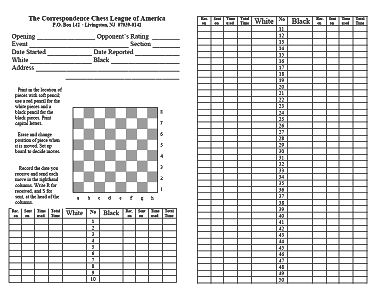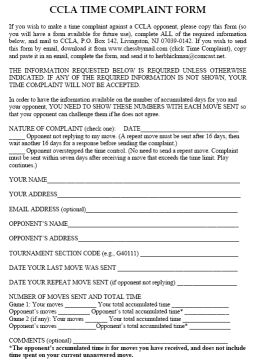1) Unless otherwise specified, the term "game" or "games" within these rules refers only to CCLA postal and email games. Except for the rule
about touching pieces and other rules inapplicable to correspondence chess, all games shall be governed by the
Laws of Chess (the official code of F.I.D.E. —
the International Chess Federation). Players must understand the rules of chess and read/write chess notation before entering CCLA events.
2) Conduct:
a) Entering any CCLA event, whether entry fee required or free entry, constitutes a player’s acceptance of and agreement to comply with all
CCLA rules of play.
b) During a Traditional chess game, players may consult pgn databases and published works on chess (see 2(h) below), but in the selection of
moves may not receive help from another player or any chess software (“chess engines”, “table bases” etc.) that generates move recommendations.
c) The CCLA Board has created the position(s) of Games Checker. Traditional games will be randomly spot-checked for engine abuse with Top3 (Advanced
Chess games are not examined.) Games will also be checked in response to specific complaints alleging engine abuse. In addition, games of anyone
claiming any tmt. or section prize, Grand Prix points prize or Best Games contest prize in Traditional chess will be checked prior to awarding of
prizes. Games played in Traditional chess events and found to be in violation of Rule 2(h) will not be published in Chess Correspondent magazine or
on the CCLA website(s.)
d) In addition to spot checks, if there is a complaint, CCLA will examine that particular game and, if it fails Top3, will examine all that player's
games in that section; games may be examined retroactively, providing this does not conflict with (f) below.
e) CCLA members may report opponents' suspected engine use only to CCLA officials. In no instance shall one member directly accuse another member of
engine abuse. Violation of this rule is covered under rule 4.
f) Penalties. A first exceeding of the engine-use threshold shall result in a warning and, if the game has been rated, rating points will be
reversed. A second violation (any section) shall result in forfeiture of that game and any other games in the section that violate 2(h). A third
violation (any section) will result in the player being withdrawn from all his remaining sections / games, and his rating / playing status
transferred to the Advanced chess division. Entry fees will not be refunded. Such re-assignment is permanent for the life of the member (dropping
out of CCLA and re-joining at a later date does not wipe the slate clean.) Note: this procedure has an effective date of January 1, 2020, established
by the Board and will not be applied retroactively. A record of all games checked, pertinent analysis and conclusion/action taken will be maintained
by the Games Checker and the TD for administrative purposes only.
g) Examination of games will be done strictly in accordance with a Board-approved methodology, as specified in (h) below. In no case shall the TD or
the Games Checker reveal what computer and components were used, which chess engine(s) were used, how many ply depths/ variations were analyzed or
whose game(s) were examined to reach a verdict. The TD may include Top3 analysis when communicating a decision to the player affected. Appeals are
covered under CCLA Rule 4. CCLA may publish articles about, and aggregate statistics on engine detection, so long as these do not identify CCLA
players by name or specific tournament sections.
h) Engine detection methodology (Top3). The traditional cc practice of following Master games in the openings is unaffected, as "book" opening moves
are ignored in Top3 analysis. Players may follow any published correspondence game played prior to 1980, and any published over-the-board game.*
Following correspondence games played after 1980, or any published computer games or analysis, will drive up a Top3 score and likely result in a
violation. Top3 also ignores "forced" moves, defined as (1) only legal move, (2) only move to escape checkmate, (3) moves made to avoid immediate
loss of material or (4) recaptures during exchanges to maintain material equality (may be deferred one or more moves.)
The remaining moves (excluding
"book" opening moves and forced moves) will be analyzed at a minimum 30-ply depth by a chess engine to determine that (1) no more than 70% of a
players' moves match an engine's top recommendation, commonly referred to as T1 percentage; no more than 80% of a player's moves match an engine's
top two recommendations, the T2 percentage (T1 + T2); no more than 90% of a player's moves match an engine's top three recommendations, commonly
referred to as T3 percentage (T1+T2+T3); (2) a player's moves do not contain more than five T1 moves in a row (commonly called a "string,") and (3)
a player's moves must contain at least one move that does not agree with an engine's Top 3 recommendations, commonly referred to as an "unranked"
move. Note: A player who initiates a forced mate-in-6 or more moves, or a combination of 6 or more moves to win material, is not in violation of the
string rule (2) above.
A Games Checker may analyze to any ply depth necessary to break tie rankings and/or any multi-PV setting to fully investigate
suspect moves / move sequences. The Games Checker will forward any adverse findings to the appropriate TD for administration of penalties under
section (g). A TD may not ignore or otherwise overrule the Games Checker's Top3 analysis and conclusion; the affected player may appeal an adverse
ruling, per CCLA Rule 4. Top3 analysis is not applied to short games which do not have at least 10 rate-able moves.
*A game between two human players, played under the auspices of a real chess organization, has a date (year) and location (or event) played, appears
in a publicly available source such as commercial book, magazine, cd/dvd, website or blog, and is considered a "published game." Informal club games,
"skittles" games, internet games between players using aliases, computer vs computer and computer vs human games, etc. do not qualify as legitimate
sources in Traditional chess. For example, a player appealing the number of "book" moves identified by the Games Checker may not cite such games to
improve his Top3 score.
3) The Tournament Director for each tournament shall be specified in The Chess Correspondent.
4) Unless otherwise specified in these rules, disputes between players shall be referred to the Tournament Director. Any ruling may be appealed
to the General Manager, if not the same person, but otherwise to the President. |
5) The player who has dispatched the record of his move must abide by that record so dispatched; no alteration may be made except to correct an
illegal move, and no subsequent change by faster mail or any other method of communication shall be allowed. In email-only events, all moves are
transmitted by email, except as described in Rule 15. For all other events, postal is used unless both players agree to email or fax, and either
player may void the agreement at any time and return the game to postal play.
6) All ambiguous moves must be clarified before play continues. All moves must be legal moves, and an illegal move may be replaced by any legal
move. Moves erased or otherwise visibly altered must be dealt with at once as illegal moves, unless also initialed by the sender. If a card includes
both a written move and a diagram of the position after that move, the move shall be considered ambiguous only if the diagram does not show the piece
moved to the square indicated by the written move. Verifying the balance of the diagram is not required, but is encouraged as a means of detecting
errors and thereby avoiding future conflicts and delays. If claimed by the opponent, the sending of an impossible, ambiguous, illegal or missing move
is an automatic five-day penalty under the 10/30 time control, with each additional offense a ten-day penalty. The incorrect omission or addition of
chess indications (such as "check", "captures", "mate", or "en passant") does not cause a move to be impossible or illegal.
7) If a player assumes that his opponent will make certain moves and sends hypothetical replies, ("if" moves) they shall not be binding until or unless
accepted by the adversary. A player accepting an "if" move must accept his opponent's proposed next move and reply to it. If more than one "if" move is
offered, the mandatory response applies only to the first "if" move.
8) A player sending a reply must specify (a) the correct move and its number to which he is replying, including any accepted "if" moves not already
acknowledged, and (b) the correct number of his own move.
9) Players must use standard (long or short form) Algebraic notation in sending moves, unless both players agree upon another unequivocal notation,
such as International Numeric or English Descriptive notation, at the beginning of the game. Descriptive has preference over Algebraic only in events
labeled Descriptive. |
10) The time limit is based on the Date of Receipt and the Date of Dispatch for each move. The Date of Receipt is the date a player is first able to
receive the opponent's move, or the assignment sheet. If a move may have reached its address more than two days prior to the Date of Receipt, the reply
move should be accompanied by an explanation for the delay in the Date of Receipt, unless previously given (e.g., an unexpected business trip.) The Date
of Dispatch is the date the player loses control over the move, usually by placing it in an official mailbox slot or giving it to the postman. A discrepancy
of more than one day, between dispatch and postmark dates, may be considered as evidence of an incorrect Date of Dispatch, and may be corrected by the
receiver. The Date of Dispatch and the Date of Receipt for email and fax are the dates given in the heading of the email message as stamped by the internet
server or fax machine. The email or fax Date of Receipt is adjusted if necessary to reflect the local time zone of the recipient, and any time beyond 8 PM
local time is treated as being received the following day. If a move may have reached its address more than one day prior to the Date of Receipt, the reply
move should be accompanied by an explanation for the delay in the Date of Receipt.
11) The Date of Receipt and the Date of Dispatch must be reported
along with each move. If a player fails to report either date, the opponent shall have the right to determine the missing date(s) as follows: (a) The Date of
Dispatch shall be the postmark, if legible, or else it shall be three days prior to receipt of the opponent's move, and (b) the Date of Receipt shall be three
days following the Date of Dispatch of the prior move. If the addresses of the two players are in different countries, or APO's, five days rather than three
days shall be used in (a) and (b) above. Each player must also show the cumulative days used by the opponent and himself on each card, in addition to the Date
of Receipt and Date of Dispatch. If a player does not dispute his opponent's Date of Receipt, Date of Dispatch and accumulated days immediately (the next move
sent,) these stand, and the player must change his record to match his opponent's. If a player fails to report either Date of Receipt or Date of Dispatch for
email or fax, the Date of Receipt may be estimated as the Date of Dispatch of the prior move (in the recipient's time zone), and the Date of Dispatch shall be
as defined in Article 10. Disputes about accumulated time that cannot be settled between players must be promptly referred to the Tournament Director for a
decision. If neither player has shown the accumulated time on the cards immediately preceding the time complaint, the Tournament Director may, at his discretion,
refuse to recognize any time limit violation and may warn the player(s) that continued refusal to list received and sent dates, and accumulated times may result
in forfeiture of the game(s).
12) The time used for each player's move is the number of days elapsed between the Date of Receipt and the Date of Dispatch, but not including any days of
vacation or special leave granted to the player (note: Sundays and holidays count in CCLA time limits.)
13) Each player is entitled to 30 days vacation in each calendar year, but all opponents and the Tournament Director must be informed in advance of vacation
days being taken. Violation of this rule may, at the Tournament Director's discretion, result in those days being treated as elapsed time, subject to the
penalties contained in rules 15 or 16. When one player goes on vacation, his opponents do not also get this time off, unless they have declared vacation
simultaneously. If a player sends moves before going on declared vacation, his opponents are obligated to reply within the applicable time limit.
14) In email-only events, the time limit is 10 moves in 40 days (10/40). In all other events, the time limit is 10/30, regardless of whether moves are sent by
postal, email or fax.
15) There may be valid explanations for exceeding the time limit, including (a) illness, documented by a physician's statement, if necessary, or (b) an
unexpected business trip. If a player is unable to transmit or receive moves by email in an email-only event, he may notify the Tournament Director and his
opponents [showing his latest move(s) and the latest move(s) received from the opponent(s)] that he is taking downtime. Downtime begins when this notification
is sent and ends when the player notifies the Tournament Director and his opponent(s) that he can resume email. Up to 30 days of downtime may be taken during
a calendar year; vacation days taken by the player are not included in this count. During downtime, games may be continued by postal mail if both players agree.
Otherwise, the game is halted and neither side is charged with elapsed time until the player ends the downtime or the 30 days is exhausted. After the 30 days
of down time are exhausted, the
|


